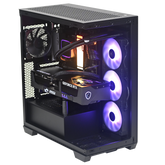AMD AGESA 1.0.0.7 BIOS Firmware for Ryzen 7000 X3D series a buggy hotfix
After users reported that their Ryzen 7000 X3D series CPUs were overheating and causing damage to motherboards and CPUs, AMD has advised motherboard vendors to hold off on including the AGESA 1.0.0.7 BIOS firmware in their updates until its next firmware update is rolled out. Gamers Nexus investigated the root causes of these incidents and found that a new firmware update was needed to address these issues. Soon after, the AGESA 1.0.0.7 BIOS firmware was released, and motherboard vendors quickly implemented their own fixes to limit voltages and prevent further damage. ASUS was particularly highlighted in the investigation and rolled out its own BETA BIOS release of the AGESA 1.0.0.7 firmware.
From HKEPC (via WccfTech)
“In response to the Ryzen 7000X3D CPU burnout incident, AMD released the AGESA 1.0.0.7 firmware to save lives. According to the motherboard manufacturer, it does not simply limit the SOC voltage to 1.3V, but also modifies the PROCHOT Control and ‘PROCHOT Deassertion Ramp Time is two mechanisms related to thermal safety, .7000X3D users must update to AGESA 1.0.0.7 BIOS as soon as possible It is understood that PROCHOT Control is a function related to CBS and SMU COMMON. It is a thermal safety function used to prevent the processor from overheating. When the temperature of the processor reaches a critical value, the CPU or other system components will send a PROCHOT signal. The processor The power is then reduced to lower the temperature and prevent possible damage. PROCHOT Deassertion Ramp Time is the time definition for the processor to return to normal power again after the PROCHOT overheating signal occurs. The time interval required for the processor to gradually increase its power and return to normal operating conditions when the temperature drops back below the critical value.AGESA 1.0.0.7 obviously becomes conservative in the definition of PROCHOT, the voltage and temperature thresholds related to PROCHOT and SOC / IMC will be greatly reduced, and the interval time between power consumption recovery will be longer, which means that this CPU burn event is not a single cause, On the one hand, the SOC voltage is too high, coupled with the imperfect thermal management, but it will take time to verify whether the problem can be really solved.“
Despite efforts to address the overheating issues associated with the Ryzen 7000 X3D series CPUs, AGESA 1.0.0.7 has been found to have issues of its own. It is now being described as a "buggy mess". According to a hardware leaker, this update only supports up to DDR5-4400, whereas the previous version, 1.0.0.6, supported up to DDR5-6000. Moreover, it has been discovered that the current firmware lacks PROCHOT Control and PROCHOT Deassertion Ramp Time functions.
According to reports, AMD has suggested that motherboard vendors hold off on including the AGESA 1.0.7.0 BIOS firmware in their updates and instead wait for the upcoming AGESA 1.0.9.0, which is currently being internally tested to address several issues. In the meantime, users are recommended to stick with AGESA 1.0.0.6 and refrain from using any BETA BIOS versions until the issues are resolved.










